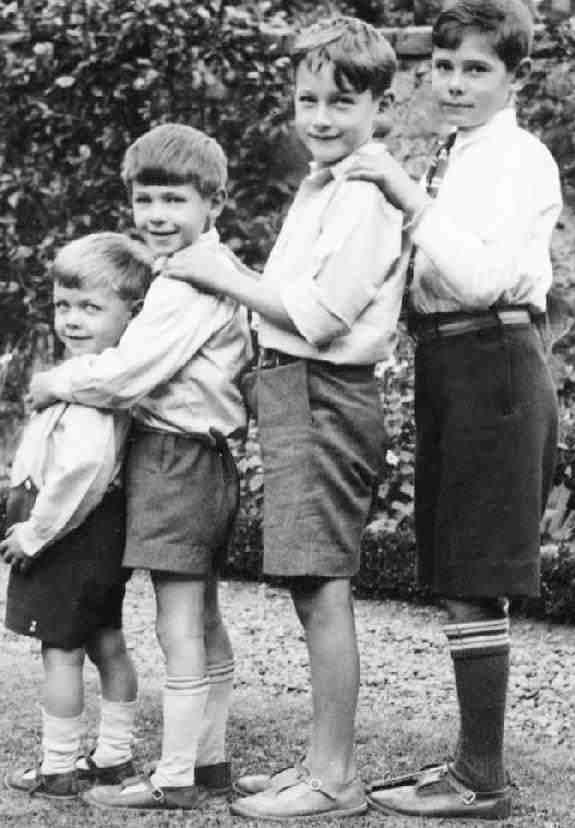
Scottish Boys' Garments: Pants

Figure 1.--This group of Scotish brothers and cousins included: Robert Couston (Perth - Age 10), Jim Couston (Musselburgh - Age 8), Ian Knight (Musselburgh - Age 6), Douglas Knight (Musselburgh - Age 4) and Oliver Couston (Perth - Age 18 months). The photograph was dated August 1932. Musselburgh is a suburb of Edinburgh. Perth is located in the highland to the north. Robert looks like he may be wearing his school clothes. Oliver was away from the main group. Notice that all of the boys wear short trousers and sandals, with and without socks. Image coutesy of the MD collection.
|
|
HBC does not yet have a good assessment of how common kilts as opposed to trousers were worn in the 19th century. Nor do we know how it varied overtime. We believe that trousers such as knickers and kneepants were more common, especually in the Lowland cities and towns, but we have no confirmation of this. By the 20th century, trousers were mich more common than kilts, although on the many rural villages before World War II many boys did wear the kilt, especially for church and other special occassions. Still pants were much more common for day to day wear and for school. Hard wearing and warm cotduroy appears to have been especially popular in Scotland. Some of the Scottish boys like English boys began wearing short trousers in the early 20th century. They were commonly worn by Scottish boys of all ages through the 1950s. Scotland being a more traditional area of the U.K., new trends such as long pants for younger boys and jeans were slower to take hold than in England.
Kilts and Pants
HBC does not yet have a good assessment of how common kilts as opposed to trousers were worn in the 19th century. Nor do we know how it varied overtime. We believe that trousers such as knickers and kneepants were more common, especually in the Lowland cities and towns, but we have no confirmation of this. By the 20th century, trousers were mich more common than kilts, although on the many rural villages before World War II many boys did wear the kilt, especially for church and other special occassions. Still pants were much more common for day to day wear and for school.
Material
Hard wearing and warm cotduroy appears to have been especially popular in Scotland. Of course Scotland is especially known for tweed. Flannel was a very popular fabric in the late 19th and early 20th century.
Chronology
Scottish boys wore kneebreeches in the 18th century. Kilts were also worn but out information is limited. We think they became relatively rare after Culloden. We note Scottish boyd wearing long pants, knickers, and knee pants during the 19th century. Kilts were also worn, but apparently not very commonly. Some of the Scottish boys like English boys began wearing short trousers in the early 20th century. They were commonly worn by Scottish boys of all ages through the 1950s. Scotland being a more traditional area of the U.K., new trends such as loing pants for younger boys and jeans were slower to take hold than in England.
Terminology
The terminology used for trousers can be very confusing. We notice that the term knickers and breeches were used to describe not only those garments but others as well. We note knickers and breeches being used to describe kneepants. See for example this pasage in a 1901 novel, "He pointed to a sharp-faced urchin of twelve … a red-haired boy with
an upturned nose, dressed in shirt and knickerbockers only. The cross
of his braces came comically near his neck – so short was the space of
shirt between the top line of his breeches and his shoulders. His
knickers were open at the knee and the black stockings below them were
wrinkled slackly down his thin legs, being loosely tied above the calf
with dirty white strips of cloth instead of garters.” [Douglas]
Knickers was also used to describe short pants. Than there is the Scottish term "breaks" which I think is used primarily to describe long pants.
Sources
Douglas, George. The House With the Green Shutters (1901).
HBC

Navigate the Boys' Historical Clothing Web Site:
[About Us]
[Introduction]
[Activities]
[Biographies]
[Chronology]
[Clothing styles]
[Countries]
[Girls]
[Theatricals]
[Topics]
[Bibliographies]
[Contributions]
[FAQs]
[Glossaries]
[Images]
[Links]
[Registration]
[Tools]
[Boys' Clothing Home]
Navigate the Boys' Historical Clothing kilt pages:
[Return to the Main Scottish garment page]
[Kilt suits]
[Scottish kilts]
[Scottish school uniform]
[Highland dance]
[Pipeband]
[Irish kilts]
[Irish boys clothing]
[Irish step dancing]
[Greek kilts]
Created: February 1, 2003
Last updated: 2:47 AM 7/7/2005



